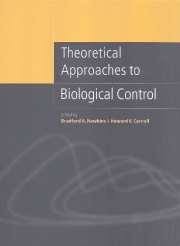Book contents
- Frontmatter
- Contents
- List of contributors
- Preface
- Part I Biological control theory: past and present
- Part II Ecological considerations
- 4 The uniformity and density of pest exploitation as guides to success in biological control
- 5 Biological control of insect pests: a tritrophic perspective
- 6 The case for indigenous generalists in biological control
- 7 Why is the parasitoid Encarsia formosa so successful in controlling whiteflies?
- 8 Parasitoid adult nutritional ecology: implications for biological control
- 9 Coexistence of multiple attractors and its consequences for a three-species food chain
- Part III Spatial considerations
- Part IV Genetic/evolutionary considerations
- Part V Microbes and pathogens
- Index
6 - The case for indigenous generalists in biological control
from Part II - Ecological considerations
Published online by Cambridge University Press: 13 August 2009
- Frontmatter
- Contents
- List of contributors
- Preface
- Part I Biological control theory: past and present
- Part II Ecological considerations
- 4 The uniformity and density of pest exploitation as guides to success in biological control
- 5 Biological control of insect pests: a tritrophic perspective
- 6 The case for indigenous generalists in biological control
- 7 Why is the parasitoid Encarsia formosa so successful in controlling whiteflies?
- 8 Parasitoid adult nutritional ecology: implications for biological control
- 9 Coexistence of multiple attractors and its consequences for a three-species food chain
- Part III Spatial considerations
- Part IV Genetic/evolutionary considerations
- Part V Microbes and pathogens
- Index
Summary
A history of neglecting ‘generalists’ as biological control agents?
Although opportunity usually overrides strategic planning when it comes to pest control, practitioners of biological control have often speculated about the features possessed by a ‘perfect’ control agent. Many of the hypothetical life-history traits for this idealized agent are self-evident – characteristics such as adaptability to new climates, good dispersal ability, and high reproductive rate. One attribute that is not so clear-cut is feeding habit, or specificity. A common belief has been that specialists should be favored over generalists when searching for, selecting, or promoting biocontrol agents. Indeed, in one of the earliest texts on insect control, Wardle & Buckle (1923) identify specificity as one of the four keys to effective control. This promotion of specificity is still strongly represented in modern writing – for instance Hoy (1994) lists specificity as one of three desirable traits to be sought in biocontrol agents. Of course, not everyone has advocated specialists as ideal biocontrol agents, and there has been a longstanding exchange of ideas about specialists versus generalists in theory and practice (Sweetman, 1936; Watt, 1965; Huffaker, 1971; Ehler, 1977; Hassell, 1978; Murdoch et al., 1985; Wilson et al., 1996). In this chapter we revisit this debate. We argue that specialists and generalists each have advantages, and that the question should not be ‘which is better?’ The more useful question concerns what trade-offs correlate with specialization versus generalization, and how do these trade-offs influence biocontrol effectiveness.
- Type
- Chapter
- Information
- Theoretical Approaches to Biological Control , pp. 103 - 115Publisher: Cambridge University PressPrint publication year: 1999
- 56
- Cited by



